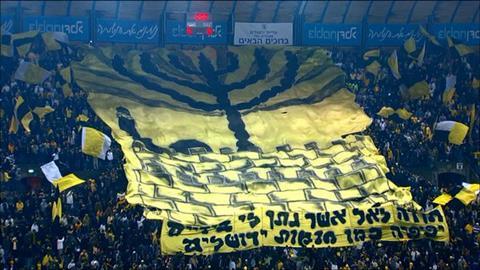Dir. Maya Zinshtein. Israel/UK. 2016. 85 mins

The relationship between sport and politics has frequently been an uneasy one. But rarely has that Venn diagram intersection between an ideology and a game proved to be so explosive, and so troubling in what it reveals about a larger society, than in the case of Beitar Jerusalem Football Club. This eye-opening documentary traces the tumultuous 2012-13 season, during which the political affiliations of a vocal group of the team’s loyal fans threatened to tear the club to pieces.
Compelling and unsettling as the events at Beitar Jerusalem FC are, what elevates the film is the relationship that director Maya Zinshtein reveals between the club’s fan base and mainstream politics
This high quality-piece of factual filmmaking, which receives its world premiere at the Jerusalem Film Festival, is assured of further festival berths: the charged subject matter should ensure a talking point status which will be attractive to programmers. The popularity and profile of Beitar Jerusalem F.C. should ensure audience interest in Israel. And, given critical support, it could also go on to enjoy some theatrical success in other territories.
Established in 1936, Beitar Jerusalem F.C. is the most controversial team in Israel. It is the only Premier League team in the country which has never signed an Arab player. This is a cause for pride for some of the core fanbase, who call themselves La Familia and chant, gloating, that they are “the most racist team in the country.” The right-wing, radical nationalists in La Familia, says one commentator wearily, think that a terrace call of “Death to Arabs” is a way of demonstrating loyalty to Israel.
The already combustible tensions around the club are ignited when, halfway through what is shaping up to be a successful season, Beitar’s Russian/Israeli oligarch owner, Arcadi Gaydamak, sends the team to Chechnya. The trip is a thinly-veiled business opportunity for Gaydamak which is sealed with the unexpected purchase of two Chechnyan players, Zaur Sadayev and Dzhabrail Kadiyev.
Although there are already several other non-Israeli players on the team, Sadayev and Kadiyev are different. They are Muslims. At a tense press conference, the captain Ariel Harush welcomes the new players and pledges support for them. He, along with chairman Itzik Korenfine and coach Eli Cohen, subsequently find themselves in the frontline for an outpouring of anger and vitriol from the fans. But the full brunt of the aggression is targetted at the Chechnyan players who, bemused and increasingly unhappy, face a torrent of abuse whenever they set foot on the pitch.
Kadiyev is benched after he snaps and trades punches with a crowd-member. And when Sadayev scores what is described as ‘the most important goal of the season’, the supporters in the East Stand stage a mass walk out. Without the backing of their fans, Beitar spirals into an accelerated losing streak which sees it threatened with relegation.
Compelling and unsettling as the events at Beitar are, what elevates the film is the relationship that director Maya Zinshtein reveals between the club’s fan base and mainstream politics. Israeli president Reuven Rivlin, who used to be the Chairman of Beitar, describes the way that many politicians used the club as a springboard to kick off a campaign. He also raises concerns that the the silence of these political figures legitimises the ingrained racism on the terraces. Beitar Jerusalem’s meltdown holds up a mirror to the wider society. And what it reveals is not pretty.
Production company: Maya Films, Duckin’ & Divin’ Films
Contact: INFO@passion-pictures.com
Producers: Maya Zinshtein, Geoff Arbourne
Executive producers: John Battsek, Nicole Stott
Screenplay: Maya Zinshtein
Cinematography: Israel (Sergei) Freedman, Yaniv Linton
Editor: Justine Wright, Noam Amit
Sound: Fionan Higgins
Music: Stephen Rennicks
Main cast: Arcadi Gaydamak, Ariel Harush, Zaur Sadayev, Dzhabrail Kadiyev, Itzik Korenfine, Ofir Kriaf, Eli Cohen
























